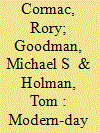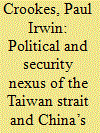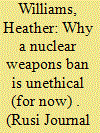| Srl | Item |
| 1 |
ID:
146318


|
|
|
|
|
| Summary/Abstract |
Recent British military interventions in Libya, Iraq and Syria have all been put to the vote in the House of Commons. This suggests a shift away from the longstanding Royal Prerogative on war-making powers towards an expectation that parliamentary authorisation is first required. As Tara McCormack argues however, there is a concurrent trend that undermines this apparent move towards greater democratic oversight of the use of military assets in conflict: the growing preference for ‘warfare by remote control’, such as the deployment of drones or military trainers. Perceived as a form of intervention with less ‘skin in the game’, such military action has so far been launched without prior parliamentary approval – and without scrutiny.
|
|
|
|
|
|
|
|
|
|
|
|
|
|
|
|
| 2 |
ID:
146319


|
|
|
|
|
| Summary/Abstract |
The 2015 Strategic Defence and Security Review envisages a return to contingency following more than a decade of enduring operations in the Middle East, but little thought is given to what this will mean for joint logistics. In this article, Andrew Curtis argues that current arrangements do not produce a fit-for-purpose command-and-control capability, nor do they fulfil the requirement for integrated training of high-readiness logistics units. He instead proposes a combined-arms approach – overseen by the existing, dedicated standing logistics headquarters – to ensure the effective integration of joint logistics force elements in future operations.
|
|
|
|
|
|
|
|
|
|
|
|
|
|
|
|
| 3 |
ID:
146323


|
|
|
|
|
| Summary/Abstract |
Graffiti has had a chequered past in the art world and in society in general, and its use in warfare has also been underplayed. In this thought-provoking article, Neil Verrall and Richard Clay illuminate the historical role and impact of graffiti in society, art and war; they argue for a fresh look at its contemporary use within influence operations and behaviour change in a time of ‘warfare in the information age’.
|
|
|
|
|
|
|
|
|
|
|
|
|
|
|
|
| 4 |
ID:
146317


|
|
|
|
|
| Summary/Abstract |
Covert action can be an important weapon in a state’s arsenal. It is, however, inherently controversial and risky. Rory Cormac, Michael S Goodman and Tom Holman argue that when considering covert action, Whitehall should look to lessons from the recent past. The UK has long used covert action, and how best to manage and co-ordinate such sensitive activity was for many decades a key preoccupation of its policy-makers and politicians. Given the secrecy involved, these lessons, and the machinery created, have been lost to history. Yet with covert action seemingly now back on the agenda, previous experience and hard-learnt lessons have assumed renewed importance.
|
|
|
|
|
|
|
|
|
|
|
|
|
|
|
|
| 5 |
ID:
146321


|
|
|
|
|
| Summary/Abstract |
This article explores the political and security implications for relations between Beijing and Taipei in light of the recent election of a new Taiwanese president. Due to be inaugurated in May 2016, Tsai Ing-wen hails from a different point on the political spectrum to that of the outgoing leadership, introducing uncertainties in the political relationship with the mainland and casting light on the continuing importance of the United States as a security actor in the region. Concurrent with outlining the nature of this political change and the uncertainties this introduces, Paul Irwin Crookes evaluates evidence of a shift in the balance of military power across the Taiwan Strait, potentially changing the dynamics of decision-making for all sides in the event of future conflict.
|
|
|
|
|
|
|
|
|
|
|
|
|
|
|
|
| 6 |
ID:
146322


|
|
|
|
|
| Summary/Abstract |
The military covenant is often regarded as a recent tradition. In this article, Mark Rynehart explains how ancient military covenants emerged in Britain during the late Roman period, and were reinforced by versions imported from southern Europe and Saxon immigrants in the early medieval era. His analysis shows that ancient military covenants continue to influence modern military doctrine and social policy.
|
|
|
|
|
|
|
|
|
|
|
|
|
|
|
|
| 7 |
ID:
146316


|
|
|
|
|
| Summary/Abstract |
Northern Ireland is rarely mentioned in the debate on the UK’s membership of the European Union (EU). However, a potential Brexit may have a significant impact on the social and economic situation in the country. Edward Burke argues that politicians in Westminster and Stormont have failed to address the risks associated with the UK’s departure from the EU. These may adversely affect the region’s prosperity and the delicate peace process.
|
|
|
|
|
|
|
|
|
|
|
|
|
|
|
|
| 8 |
ID:
146320


|
|
|
|
|
| Summary/Abstract |
The Humanitarian Impacts of Nuclear Weapons Initiative and ongoing tension between NATO and Russia have put the morality of nuclear weapons back under the spotlight. The new strategic environment suggests an opportunity to revisit principles of nuclear ethics, including the connection with security and the responsibility to pursue arms control and disarmament. Heather Williams argues that for NATO, that means balancing the need for nuclear assurances with a commitment to disarmament and engaging with the Humanitarian Impacts Initiative, perhaps by having a NATO nuclear possessor host the next conference. For the Humanitarian Impacts Initiative, meanwhile, it means abandoning pursuit of a nuclear-weapons ban and re-focusing on survivor testimonies as part of nuclear education and consequence-management scenarios. A nuclear-weapons ban at this time, though well intentioned, would ignore states’ security concerns and has the potential to undermine other disarmament efforts.
|
|
|
|
|
|
|
|
|
|
|
|
|
|
|
|